02 Nov2020
By Katrina Norfleet
The University of Michigan’s TeachingWorks is offering a series of free virtual mini-courses for English language arts teacher educators as part of its goal is to create a system for teacher preparation and establish support that will produce skillful beginning teachers who disrupt inequity.
The mini-courses will help build an understanding of critical content in ELA and develop practice-based approaches for teaching that content to novice teachers. This series will support ELA teacher educators to develop K-12 instruction and teacher education that fills immediate needs for children and contributes to building an education that dismantles injustice instead of perpetuating it.
The next course available for registration takes place on December 4, 2020:
02 Nov2020
By Matthew Wales

Themed Leadership During Difficult Times, AACTE’s first session of the 2020 Leadership Academy Series, held on October 14, explored how three institutions have risen to the challenge and taken strides to make lasting policy and programmatic changes related to diversity, equity, and inclusion. To continue the discussion, AACTE has provided panelist Lisa Norton, dean of the College of Education & Health Sciences at Touro University, California and one of the featured panelists, with some additional questions from session attendees. Here is what she had to say:
The Graduate School of Education at Touro University, California recently held a series of informative and courageous conversations regarding what it means for education to live diversity in 2020 and beyond. Can you share some of the insights related to accessibility for all PK-12 students in a remote learning environment?
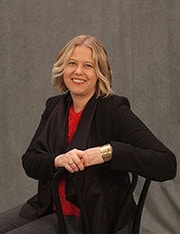 Our current Academic College Instructional Designer and Graduate School of Education faculty member, Dr. Michael Barbour, is internationally known for work on PK-12 remote learning and accessibility. We are lucky to have him to help both our own campus and the local school districts with information related to creating an inclusive online environment. We conducted a webinar series entitled Diversity Now, in which we addressed this and many other topics. We are now in discussions to help the school district with additional support for families. This support includes tutoring and mentoring children in two of the schools and possibly partnering on a large-scale grant effort through the state.
Our current Academic College Instructional Designer and Graduate School of Education faculty member, Dr. Michael Barbour, is internationally known for work on PK-12 remote learning and accessibility. We are lucky to have him to help both our own campus and the local school districts with information related to creating an inclusive online environment. We conducted a webinar series entitled Diversity Now, in which we addressed this and many other topics. We are now in discussions to help the school district with additional support for families. This support includes tutoring and mentoring children in two of the schools and possibly partnering on a large-scale grant effort through the state.
02 Nov2020
By AACTE
On behalf of the Board of Directors of the American Association of Colleges for Teacher Education (AACTE), President and CEO Lynn M. Gangone issued the following statement today urging educators to resist the Trump administration’s attack on critical race theory and other anti-racism work in education:
“In its June 4 statement, the AACTE Board of Directors called educators to take courageous action on race matters in America to address not only recent racial injustices across the nation but also structural racism that has deep, historic roots in our society. Critical race theory represents the scholarly work of educators who provide research evidence and expertise on how the legacy of slavery and inequality in America has unequivocally influenced our American way of life, including our system of education, and on effective ways to dismantle structural racism in American society. It has long been the focus of scholars across many disciplines, which has contributed to the great strides institutions have made in advancing human and civil rights for all Americans.
Banning federal funds to be used for professional development that addresses topics like white privilege, implicit bias, and structural racism, which are examined within critical race theory, is a denial of the historic realities of our country, and is an assault on the strategic gains institutions of higher education and educator preparation programs have made to enlighten students and affect change that promotes racial and social justice for all. Educators must resist any setbacks to the many years of research and activism scholars have made to progress our nation into a society that values the lives of all human beings.
AACTE and its member institutions are committed to revolutionizing education by upholding high standards in the preparation of future teachers through inclusive curriculum and evidence-based instructional strategies, modeling, and advocacy that dismantle racial oppression. AACTE members are actively working to diversify the teaching profession, address the teacher shortage, redesign curricula that reflects the needs of 21st century learners, advocate for policies that fund student teachers of color, and build social justice partnerships for strengthening the education community—all in a concerted effort to advance diversity, equity, and inclusion in PK-20 education. Critical race theory is at the foundation of this vital work. AACTE calls on educators and the educator preparation community to stay the course and to actively support the work of critical race theorists and other anti-racism efforts for building a more racially just society.
###
AACTE: The Leading Voice on Educator Preparation
The American Association of Colleges for Teacher Education is a national alliance of educator preparation programs and partners dedicated to high-quality, evidence-based preparation that assures educators are profession-ready as they enter the classroom. The 700 member institutions include public and private colleges and universities in every state, the District of Columbia, the Virgin Islands and Guam. Through advocacy and capacity building, AACTE promotes innovation and effective practices that strengthen educator preparation. Learn more at aacte.org.
23 Oct2020
By Matthew Wales
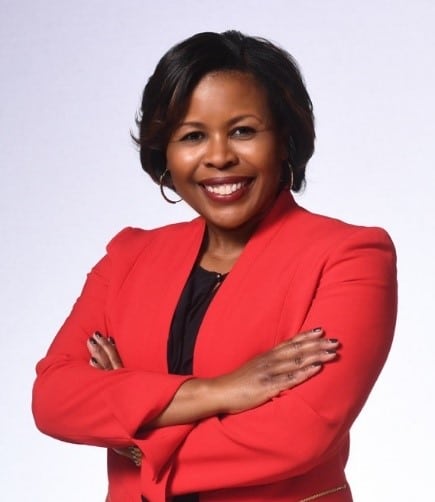 Every year, AACTE typically holds its Leadership Academy as an in-depth, face-to-face, hands-on training for those educators seeking to begin or enhance their roles in academic leadership. Given the current Covid-19 pandemic, AACTE wanted to bring a portion of that experience to its membership, and thus the 2020 Leadership Academy Series was created.
Every year, AACTE typically holds its Leadership Academy as an in-depth, face-to-face, hands-on training for those educators seeking to begin or enhance their roles in academic leadership. Given the current Covid-19 pandemic, AACTE wanted to bring a portion of that experience to its membership, and thus the 2020 Leadership Academy Series was created.
With the theme of Leadership During Difficult Times, the Leadership Academy Series explores topics that are more relevant than ever to our members. The first session of the series, held on October 14, explored how three institutions have risen to the challenge and taken strides to make lasting policy and programmatic changes related to diversity, equity, and inclusion.
Monika Williams Shealey, senior vice president for diversity, equity and inclusion at Rowan University, was one of three distinguished panelists. She recently took time to answer some additional questions from attendees. Here is what she had to say:
22 Oct2020
By Andre ChenFeng
“We are more than test scores.” That was the refrain I heard from my social sciences colleagues in the teachers’ lounge protesting our school’s focus on standardized tests. The middle school was located in a poverty-impacted community with over 95% of students of color. In 2009, I was finishing my fifth-year teaching and recall asking myself, “Why are the standardized tests such an evil thing? Don’t we need assessments to measure what the students are learning?” (ChenFeng, 2009).
One of the signature education policies in my early career was the No Child Left Behind (NCLB) Act of 2002. Teachers have different opinions of NCLB, but most educators and policy makers would agree that NCLB brought upon a culture of “over-testing and one size fits all mandates” (Duncan, 2015). During the 12 years I taught middle school math in Los Angeles, not once did I examine the intersection of white supremacy and education policy in my own classroom instruction. Overwhelmed by the high-stakes testing environment, and with a roster of 130 students, I was not aware of the impact of federal education policy on my teaching beliefs and instruction. In retrospect, I upheld color-evasive ideology and believed in a pedagogy that promoted the myth of meritocracy (Bonilla-Silva, 2017 as cited in Diem & Welton, 2020). In other words, I did not consider how race and racism shows up in the classroom or the ways I was complicit in perpetuating the false notion of pulling ourselves up by the bootstraps.
20 Oct2020
By Robin Chenoweth
The following article is an excerpt from Inspire Magazine and is reprinted with permission.
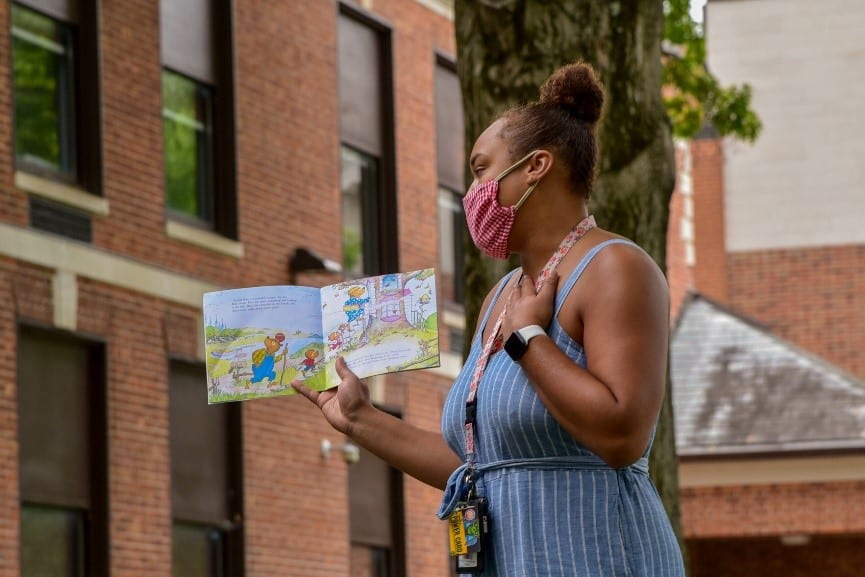 After schools shut down in March due to COVID-19, teacher Sarah Thornburg and her team tackled remote teaching with gusto.
After schools shut down in March due to COVID-19, teacher Sarah Thornburg and her team tackled remote teaching with gusto.
“We were like, ‘Let’s go.’ We found out, not only could we not teach the way that we wanted, but we shouldn’t,” the Columbus, Ohio, teacher said. “Everything had to slow down and focus not on content but on (students’) mental well-being.”
Some high-schoolers doubled work hours to pay bills. Some feared they would expose grandparents to the virus. Families lost businesses.
“That’s a burden that’s incredible for anybody to have, much less for a 15-year-old to deal with,” Thornburg said. “You can’t teach a child who’s completely freaking out about, ‘Are we going to lose our home?’ That was eye-opening.”
02 Oct2020
By Jacqueline E. King, Ph.D.

To better understand and meet the needs of its members, AACTE is launching a survey on how educator preparation programs are impacted by and reacting to the twin crises of the pandemic and racial violence and inequity in the United States. This survey follows up on a similar effort last spring to capture how the pandemic was impacting members’ ability to prepare future educators.
The chief representative for each AACTE member college and university will be invited to complete the survey. The survey will be open October 7 through November 6. Results will be released in November. Deans, directors, and chairs are asked to be on the lookout for this invitation and to complete the survey at their earliest convenience. AACTE will use member responses to
- Determine the support members need
- Inform the public and policy makers about how the coronavirus and racial inequity crises are affecting educator preparation and how members are leading during these crises
- Share aggregated information to help you benchmark your experience against your peers.
For more information and resources on COVID-19 and educator preparation, please visit AACTE’s COVID-19 Resource Page.
29 Sep2020
By Katrina Norfleet
 The Patton College of Education at Ohio University has initiated an educational series with the goal of enhancing knowledge about racist and anti-racist behaviors among citizens of the university and global communities. The Black Live Matters Munch & Learn Series features educators and industry leaders from diverse backgrounds who share the same passion for improving the culture that threatens U.S. communities and nation.
The Patton College of Education at Ohio University has initiated an educational series with the goal of enhancing knowledge about racist and anti-racist behaviors among citizens of the university and global communities. The Black Live Matters Munch & Learn Series features educators and industry leaders from diverse backgrounds who share the same passion for improving the culture that threatens U.S. communities and nation.
To date, three panel discussion have taken place:
Advocacy & Allyship: Every Day, Not Just When it is Trending
This session, which challenges participants to recognize and speak up against racism, features the following speakers:
- Brandi Baker, co-founder, Athens Parents for Racial Equality
- Tyrone Carr, director, Alumni Diversity Initiatives/Racial Equity Coalition of Athens
- Winsome Chunnu, director, Diversity and Inclusion
- Sarah Garlington, assistant professor, Department of Social Work/Showing Up for Racial Justice (SURJ)
29 Sep2020
By Katrina Norfleet
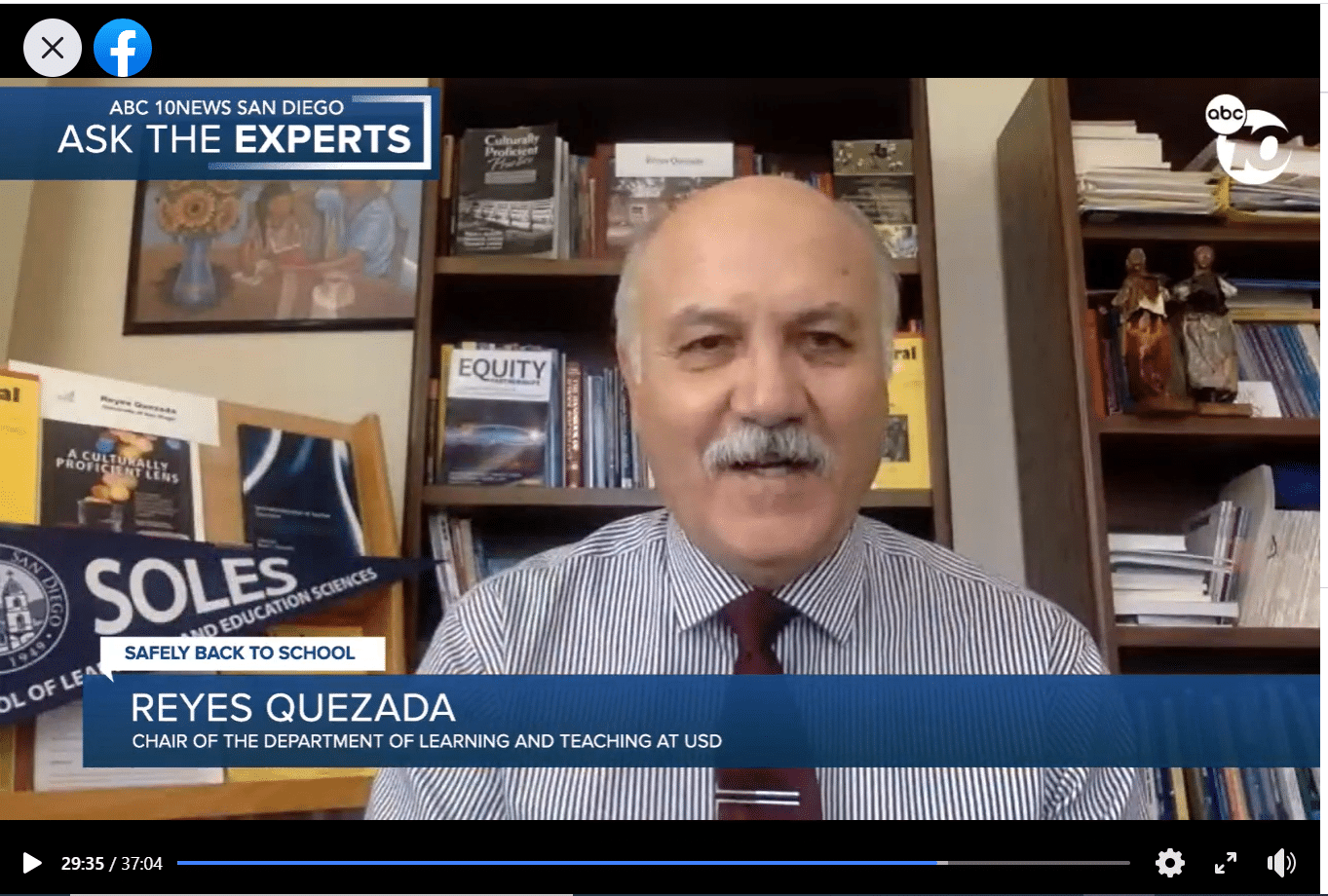
As many parents have questions about how to navigate the current school year with their children at home, ABC 10News anchor Lindsey Peña offered them an opportunity to talk with Reyes Quezada, chair of the Department of Learning and Teaching from University of San Diego USD, about their concerns. Reyes fields questions about distance learning, early childhood education, and bilingual education during the segment.
His advice includes tips that families can use to replicate what’s happening in schools to support their students at home. During the interactive session, Reyes also emphasizes the different ways teachers can communicate to meet the needs of the students during remote learning, including socio-emotional learning.
Watch the full interview on ABC10News Facebook page.
25 Sep2020
By Katy Bateman and Candice Douglass

The Office of Superintendent of Public Instruction (OSPI) and the Haring Center for Inclusive Education at the University of Washington announced that they are expanding their Inclusionary Practice Project (IPP) to include preschools across the state. This work is part of a statewide effort to help more schools to adopt a culture of inclusion.
“When we meaningfully include students with disabilities in general education settings with their peers, all students see improved academic and social outcomes,” said Glenna Gallo, assistant superintendent of special education at OSPI.
In Washington, 49.7% of students with disabilities are participating in early childhood classes separate from their peers. Further, Washington is currently one of the least inclusive states, ranking 44th in the nation.
23 Sep2020
By Weade James
The Ohio State University’s College of Education and Human Ecology will host a webinar series this fall on anti-racism in educational research for its alumni and the general public. This series, titled “Unapologetic Educational Research: Addressing Anti-Blackness, Racism and White Supremacy,” will examine how to conduct research on race that moves beyond the standardized approach to educational research. Participants will learn strategies to ensure that their research practices are equitable to inform findings that do not perpetuate the marginalization of people of color.
The series will launch on October 1, and feature sessions on a variety of topics, including engaging “diversity” in qualitative research, interrogating whiteness, and conducting research with indigenous methodologies. The webinar will feature guest alumni: D-L Stewart of Colorado State University, Rich Milner of Vanderbilt University, and April Peters-Hawkins of the University of Houston.
Learn more about the events and how to register.
21 Sep2020
By Katrina Norfleet
With the growing racial unrest in the country, higher education institutions are uniquely situated to promote anti-racism through education, create safe spaces for marginalized communities, engage in coalition building and ensure accountability in addressing bias, harassment and discrimination complaints. Colleges and universities across the country are responding to the current climate and the persistent issues related to diversity, equity and inclusion by appointing Chief Diversity Officers in record numbers. In an upcoming panel session hosted by Rowan University, Chief Diversity Officers at New Jersey higher education institutions will discuss promising gains in reimagining campuses that center the voices of diverse communities and leading institutional change that results in positive outcomes for students, faculty, and staff.
The session, “Dreams Will Not Be Deferred: A Conversation with Chief Diversity Officers on the Status Of Diversity, Equity And Inclusion In New Jersey Higher Education Institutions,” will take place Friday, September 25, 12:00 – 1:30 p.m. Join the conversation at GO.ROWAN.EDU/DEINJCDO.
14 Sep2020
By Leslie T. Fenwick
The following article by AACTE Dean in Residence Leslie T. Fenwick is reprinted with permission from Diverse: Issues In Higher Education, 2020.
Dear Generation Z Students,
You are digital natives. So, this letter would better reach you by video, Instagram, Snapchat, maybe Twitter or a hashtag. But I need more letter characters and time than these platforms allow.
Please bear with me as you read. I warn you: First, my history recitation may seem unrelated but stick with me. Second, you might be tempted to read my analysis of White male power as a screed against all White males. It is not.
Did you learn about Pickett’s charge at Gettysburg in your history class? I’d like you to consider this battle as a metaphor for what you’re witnessing now with the murders of George Floyd, a truck driver and bar bouncer laid off due to the COVID pandemic; Breonna Taylor, an EMT and emergency room tech; Ahmaud Arbery, an avid jogger; and, the assault of Christian Cooper, a Harvard grad and bird watcher victimized by a White woman who used an old, violent trick – call the police and lie about being attacked by a Black man .
General George Pickett (known as the Lost Cause General of the Confederate South) fought a losing battle on July 3, 1863. Pickett and his all White male brigade were fighting to maintain an apartheid south built on the brutalizing, free labor of enslaved African men, women, and children. Pickett moved well above the Mason-Dixon Line and took about 12,000 Confederate soldiers straight into the heart of Union territory, Pennsylvania.
14 Sep2020
By Matthew Wales

For much of 2020, COVID-19 has forced AACTE and its members to “think outside the box” and reimagine programming. Just last week, AACTE conducted its inaugural virtual event, with educators coming together to receive advocacy training and learn effective techniques for effectively engaging with political leaders. And in keeping with innovating its professional development opportunities during the current pandemic, the association is pleased to announce the 2020 AACTE Leadership Academy Series.
In lieu of the traditional, in-person, four-day training, this years’ experience will offer a series of interactive sessions for attendees. The six-session experience will take place in two parts, with three sessions to be offered this fall, and the other three sessions to be offered during the 2021 Annual Meeting. Under the theme of “Leading During Difficult Times,” the three fall sessions will explore content in the following areas:
October 14 – Addressing Issues in Diversity, Equity, and Inclusion
October 27 – Collaborative Decision-Making During Crisis
November 10 – Re-Thinking Field Experience
14 Sep2020
By Jacqueline Rodriguez
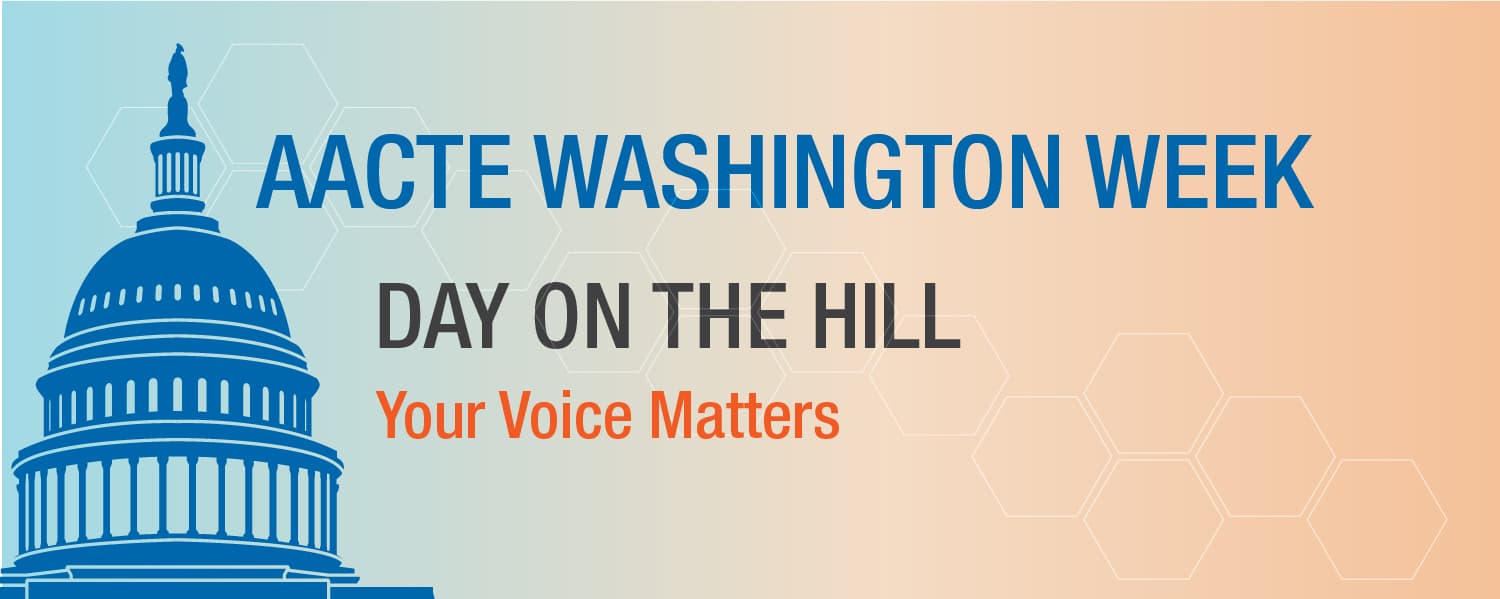 AACTE delivered its first virtual Day on the Hill advocacy event this past week. Over two days, attendees met with Congressional staff, AACTE Committee on Government Relations members, and panelists to develop their advocacy toolkit. This week, the attendees will host two days of Congressional visits with the senators and representatives from their states. AACTE state teams will be advocating for the AACTE 2020 Legislative Priorities, which describe the needs of educator preparation as we address twin pandemics: COVID-19 and racial injustice.
AACTE delivered its first virtual Day on the Hill advocacy event this past week. Over two days, attendees met with Congressional staff, AACTE Committee on Government Relations members, and panelists to develop their advocacy toolkit. This week, the attendees will host two days of Congressional visits with the senators and representatives from their states. AACTE state teams will be advocating for the AACTE 2020 Legislative Priorities, which describe the needs of educator preparation as we address twin pandemics: COVID-19 and racial injustice.
In preparation for their virtual Congressional Visits, attendees practiced how to communicate the priorities to legislative leaders, were briefed on current data related to educator shortages, the important to increase funding toward TEACH grants and Teacher Quality Partnership Grants within educator preparation programs, and the value of funding the Institute for Education Sciences, which is the principal research agency for education in the United States.
In addition, attendees received resources to support their learning. Each of these resources is available to all AACTE members!








 Our current Academic College Instructional Designer and Graduate School of Education faculty member, Dr. Michael Barbour, is internationally known for work on PK-12 remote learning and accessibility. We are lucky to have him to help both our own campus and the local school districts with information related to creating an inclusive online environment. We conducted a
Our current Academic College Instructional Designer and Graduate School of Education faculty member, Dr. Michael Barbour, is internationally known for work on PK-12 remote learning and accessibility. We are lucky to have him to help both our own campus and the local school districts with information related to creating an inclusive online environment. We conducted a  Every year, AACTE typically holds its Leadership Academy as an in-depth, face-to-face, hands-on training for those educators seeking to begin or enhance their roles in academic leadership. Given the current Covid-19 pandemic, AACTE wanted to bring a portion of that experience to its membership, and thus the
Every year, AACTE typically holds its Leadership Academy as an in-depth, face-to-face, hands-on training for those educators seeking to begin or enhance their roles in academic leadership. Given the current Covid-19 pandemic, AACTE wanted to bring a portion of that experience to its membership, and thus the  After schools shut down in March due to COVID-19, teacher Sarah Thornburg and her team tackled remote teaching with gusto.
After schools shut down in March due to COVID-19, teacher Sarah Thornburg and her team tackled remote teaching with gusto.
 The Patton College of Education at Ohio University has initiated an educational series with the goal of enhancing knowledge about racist and anti-racist behaviors among citizens of the university and global communities. The Black Live Matters Munch & Learn Series features educators and industry leaders from diverse backgrounds who share the same passion for improving the culture that threatens U.S. communities and nation.
The Patton College of Education at Ohio University has initiated an educational series with the goal of enhancing knowledge about racist and anti-racist behaviors among citizens of the university and global communities. The Black Live Matters Munch & Learn Series features educators and industry leaders from diverse backgrounds who share the same passion for improving the culture that threatens U.S. communities and nation.

 AACTE delivered its first virtual Day on the Hill advocacy event this past week. Over two days, attendees met with Congressional staff, AACTE Committee on Government Relations members, and panelists to develop their advocacy toolkit. This week, the attendees will host two days of Congressional visits with the senators and representatives from their states. AACTE state teams will be advocating for the
AACTE delivered its first virtual Day on the Hill advocacy event this past week. Over two days, attendees met with Congressional staff, AACTE Committee on Government Relations members, and panelists to develop their advocacy toolkit. This week, the attendees will host two days of Congressional visits with the senators and representatives from their states. AACTE state teams will be advocating for the